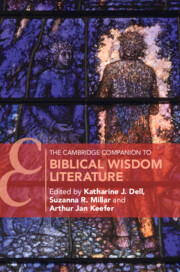Book contents
- The Cambridge Companion to Biblical Wisdom Literature
- Cambridge Companions to Religion
- The Cambridge Companion to Biblical Wisdom Literature
- Copyright page
- Contents
- Contributors
- Acknowledgement
- Abbreviations
- Part I The Context of Wisdom Literature
- Part II Wisdom Literature in the Hebrew Bible
- 8 Proverbs
- 9 Job
- 10 Ecclesiastes
- 11 The Song of Songs
- 12 Wisdom Psalms
- 13 Wisdom’s Wider Resonance
- Part III Wisdom Literature beyond the Hebrew Bible
- Part IV Themes in the Wisdom Literature
- Bibliography
- Index
- Cambridge Companions to Religion
- References
8 - Proverbs
from Part II - Wisdom Literature in the Hebrew Bible
Published online by Cambridge University Press: 28 July 2022
- The Cambridge Companion to Biblical Wisdom Literature
- Cambridge Companions to Religion
- The Cambridge Companion to Biblical Wisdom Literature
- Copyright page
- Contents
- Contributors
- Acknowledgement
- Abbreviations
- Part I The Context of Wisdom Literature
- Part II Wisdom Literature in the Hebrew Bible
- 8 Proverbs
- 9 Job
- 10 Ecclesiastes
- 11 The Song of Songs
- 12 Wisdom Psalms
- 13 Wisdom’s Wider Resonance
- Part III Wisdom Literature beyond the Hebrew Bible
- Part IV Themes in the Wisdom Literature
- Bibliography
- Index
- Cambridge Companions to Religion
- References
Summary
In his chapter on Proverbs, Christopher Ansberry provides a refreshing introductory approach to the book, not least because he starts with the history of interpretation rather than letting thematic concerns dominate. He identifies five patterns within the history of the book’s interpretation, including a focus on character formation, debates about the nature of its ‘wisdom’ and place in the canon, interest in its reception via matters of date and authorship, the discovery of comparative ancient Near Eastern material, and current, expanding interdisciplinary approaches to the book. A section on the fundamental nature of the book takes on matters of form, genre, poetic features, and the idea of a ‘collection’, whilst granting admiration rather than suspicion to the complexities of the book’s sayings. Likewise, the structure of Proverbs, though containing many parts, comes together into a coherent whole, an ‘anthology’, to which each piece contributes. Ansberry concludes by proposing four ‘dominant’ themes in the book: the fear of the Lord; wisdom; moral order and created order; retribution and reward.
- Type
- Chapter
- Information
- The Cambridge Companion to Biblical Wisdom Literature , pp. 137 - 161Publisher: Cambridge University PressPrint publication year: 2022

